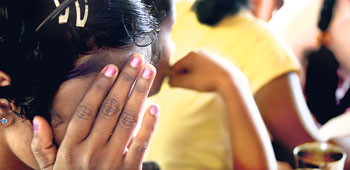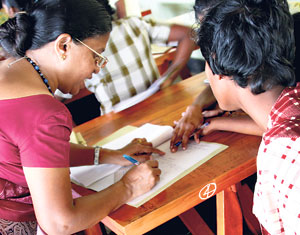Powerful notes of a song waft through the still clear air, competing only with bird calls and accompanied by the orchestra of the cicadas and the rhythmic beating on tables.
Tranquillity and peace, enhanced by the surroundings…………a river gently flowing by, a landscape of green, mostly coconut country on one side and mountains on the other, a far cry from the dust and the grime, the blood and the horror of the battlefront.
And the masculine voice paints pictures of a better tomorrow in a language that may not be heard that often in this area. Here, 40 km from Colombo, protagonists have become partners to build a better life for those drawn into a war not of their own choosing.
We are seated in a spacious hall with a few sewing machines around, where a tailoring class has been in progress and during the tea-break the group urges one or the other to sing a song. It is the Protective Accommodation and Rehabilitation Centre (PARC) run by the Bureau of the Commissioner-General of Rehabilitation.
A motley group of youth, both men and women, had earlier been poring over sketches and meticulously filing sheets of paper with pieces of cloth with different types of stitches on them. The files are an eye-opener - the covers depicting beautifully hand-drawn pictures - two hearts with doves hovering around, children in colourful clothes and flowers.
Dressed in clean clothes, they have a comfortable routine each day, including vocational training in tailoring, aluminium work, welding, wiring, plumbing, landscaping and cookery.
These are youth, who as children had been coerced, brainwashed or abducted to join the different factions of militants in a war not of their making, the futile purpose of which they had not even begun to comprehend.
Now these "child victims" are being cared for and looked after by army officers, who are often called "Appa" and "Amma" by most who have not known such filial love. Currently there are 30, 16 males and 14 females.
The youngest among the boys is now 17, having come when he was 16 and the youngest girl is 17, says Capt. Chanaka Weerasinghe, who is part of the team of officers looking after them. The team headed by Major B.B.H. Fernando includes Capt. D.K.K.J. Pulliyedda and Lieuts. Prabashini Ellawela and Indra Munasinghe.
Lieut. Ellawela recalls how the girls wanted "thodu" (earrings) as soon as they arrived and Lieut. Munasinghe points out the easy camaraderie the group shares.
Many of the stories of these erstwhile child soldiers are similar but different at the same time.
For Manikkam* there was no option but to join the LTTE when his family broke up and he had nowhere to go. Recruited at 14, with hardly an education, the training began by watching war movies. Where he had had no food in his impoverished home, he was given one meal a day and absorbed into a structure which resembled a family, with a feeling of oneness.
His fighting skills were such that soon he was promoted to the rank of "Major" and even had about 150 combatants under him. With no education and unable to grasp the intricacies and motives of a battle he did not understand, he was with them for 12 years, before surrendering to the armed forces.
It was slightly different in the case of Kamala*, an English teacher who had returned after training to take up her appointment in the Wanni. The Tigers wanted a family member to join but Kamala was insistent that her younger brother and sister should follow their higher studies. Thus she reluctantly went in their place, sacrificing her career as a teacher.
After weapons training, seven girls were in a bunker facing the fire of the advancing troops, when two committed suicide by swallowing the cyanide capsule, three were killed and she and another girl surrendered.
Selvam* was just 12 when he was taken by the LTTE, but later released to UNICEF during the ceasefire and sent home. However, he was once again forcibly recruited when the fighting resumed, but gave the slip to the others when on guard duty and surrendered to the army.
From a broken home and with no education, Rajan* had been recruited not by the LTTE but by the TMVP in the east, but had fled that group as soon as he could while Sivakumaran*, whose voice filled the air had been with the LTTE, urging the fighters to battle through song. After intensive training, he had joined the Charles Anthony Brigade.
What of the future? "They are expected to stay here for about one year until they find their feet," explained Major Fernando, adding that ICRC help has been sought to locate their families. “If they don't want to go back we will find them jobs elsewhere.”
Those who are in contact with their families are allowed to call them and family-visits are encouraged, with the mothers sometimes staying over at the PARC.
What of the hopes of the youth? "I want to go abroad," smiles one, while a majority nod their heads in unison. The English teacher, however, has a different aspiration. She longs to teach "somewhere in the middle of the country".
We say goodbye to the youth as the final notes of the song hang in the air……. "a better tomorrow, a tomorrow that is ours, sans racism".
(* Names changed to protect their identity)
The role of PARC
The Protective Accommodation and Rehabilitation Centre (PARC) has been set up under the Commissioner-General of Rehabilitation, Suhada Gamalath who is also Justice Ministry Secretary, in keeping with a sustainable government initiative to help child victims who have been recruited by militant groups.
"When the conflict erupted in 1983, although there was awareness that many of those involved may be children (under18), there was no systematic database," explains Dr. Hiranthi Wijemanne, a child rights activist who is Advisor to the Commissioner-General. "Probably because it was felt that the conflict would end soon, the matter was not given much priority."
However, in the 1990s, when the Convention on the Rights of the Child came into force, all rights of children including the right not to be employed as domestic servants and not be recruited as child soldiers came into focus, The Sunday Times understands.
During the ceasefire of 2002, UNICEF set about collecting data on child recruitments and it was in 2003 that a Transit Centre was opened in Kilinochchi by this UN agency for about 15 such victims but the initiative could not be sustained, it is learnt.
In September 2006, the government working in tandem with agencies such as UNICEF, issued a Gazette notification on the surrender of all combatants including children. Initially, since there was no well-organized protective centre, children were kept at the Pallekelle open prison camp, The Sunday Times learns.
However, as that was considered unsatisfactory, moves were already underway to find a suitable place and set up the facilities required."These children are not criminals. It is force of circumstances that has led them to be child soldiers," stressed Dr. Wijemanne, explaining that most of them have become vulnerable due to poverty, broken homes and little or no education.
After much work, sorting out problems like water etc, through the untiring efforts of Mr. Gamalath and also Deputy Commissioner-General Col. Modestus Fernando, it was that the PARC saw the light of day, becoming a comfortable home set in a pleasant environment for these youth, it is learnt.
Now organizations such as the Kadirgamar Foundation are giving their unstinted support, says Dr. Wijemanne, who on the day The Sunday Times visited PARC had taken five computers from the Foundation, to enable these youth to gain some computer literacy. This is in keeping with the late Minister Lakshman Kadirgamar's efforts to give a place in society to this victimized and vulnerable group.
On December 15, last year, a Gazette notification was issued by President Mahinda Rajapaksa on child surrendees, detailing child-friendly procedures while a policy framework and standards to be maintained at centres being developed by the National Child Protection Authority. The resources to run the PARC are from the President's Office.
With zero-tolerance of the recruitment of child soldiers, the next step is for more centres to get them back into the mainstream, says Dr. Wijemanne.
One more is on the cards in Jaffna. Continued from Page 1
However, as that was considered unsatisfactory, moves were already underway to find a suitable place and set up the facilities required.
"These children are not criminals. It is force of circumstances that has led them to be child soldiers," stressed Dr. Wijemanne, explaining that most of them have become vulnerable due to poverty, broken homes and little or no education.
After much work, sorting out problems like water etc, through the untiring efforts of Mr. Gamalath and also Deputy Commissioner-General Col. Modestus Fernando, it was that the PARC saw the light of day, becoming a comfortable home set in a pleasant environment for these youth, it is learnt.
Now organizations such as the Kadirgamar Foundation are giving their unstinted support, says Dr. Wijemanne, who on the day The Sunday Times visited PARC had taken five computers from the Foundation, to enable these youth to gain some computer literacy. This is in keeping with the late Minister Lakshman Kadirgamar's efforts to give a place in society to this victimized and vulnerable group.
On December 15, last year, a Gazette notification was issued by President Mahinda Rajapaksa on child surrendees, detailing child-friendly procedures. The policy framework and standards to be maintained have been developed by the National Child Protection Authority. The resources to run the PARC are from the President's Office.
With zero-tolerance of the recruitment of child soldiers, the next step is for more centres to get them back into the mainstream, says Dr. Wijemanne.
One more is on the cards in Jaffna.
|


